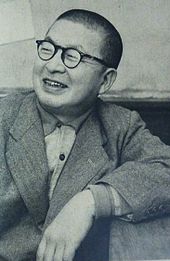Murayama Tomoyoshi
Murayama Tomoyoshi ( Japanese 村 山 知 義 ; January 18, 1901 , † March 22, 1977 ) was a Japanese writer .
Life
During his student days, Murayama became involved with Western philosophy and became a follower of Marxism. After a brief visit to Tokyo University , he went to Berlin in 1922 and studied painting. A painting with the German title “Dedicated to beautiful girls” (oil on canvas, 93.5 × 80 cm) has survived from this period. An avid painter himself since his youth, he admired Wassily Kandinsky in particular and Constructivism in general . The German avant-garde theater scene, which he got to know during a stay, made a great impression on him.
After his return to Japan in 1923, he founded an avant-garde artist group, which had great success with an experimental dance and theater evening at the Tsukiji Shōgekijō . In 1924 he was commissioned to write a Shigeki version of Georg Kaiser's From Morning to Midnight . From 1926 he wrote his own plays and became one of the leading representatives of proletarian drama. The play Boryokudanki about the Chinese railroad strike of 1923 is considered one of the most important works of this genre.
In 1932 he was arrested. In 1933 he distanced himself from Marxism, but tried to keep the left theater movement alive during the war. After 1945 he worked mainly as a theater director. In 1974 the theater magazine Teatro honored him on the occasion of his 400th drama production. In addition to plays, Murayama also wrote novels and children's literature.
Individual evidence
- ↑ Tokyo Metropolitan Art Museum (ed.): Kindai Nihon bijutsu no ayumi . Exhibition, 1979.
swell
- Gabrielle H. Cody: The Columbia Encyclopedia of Modern Drama . Volume 2, Columbia University Press, 2007, ISBN 978-0-231-14424-7 , pp. 940-41.
- Harry D. Harootunian: Overcome by Modernity: History, Culture, and Community in Interwar Japan . Princeton University Press, 2001, ISBN 978-0-691-09548-6 , pp. 101 ff.
- Hilaria Gössmann, Andreas Mrugalla: 11th German-speaking Japanologist Day in Trier 1999 . Volume 2, LIT Verlag Münster, 2001, ISBN 978-3-8258-4464-6 , pp. 244-45.
| personal data | |
|---|---|
| SURNAME | Murayama, Tomoyoshi |
| ALTERNATIVE NAMES | 村 山 知 義 (Japanese) |
| BRIEF DESCRIPTION | Japanese writer and theater director |
| DATE OF BIRTH | January 18, 1901 |
| DATE OF DEATH | March 22, 1977 |
